Flour Power: Exploring the World of Baking Career
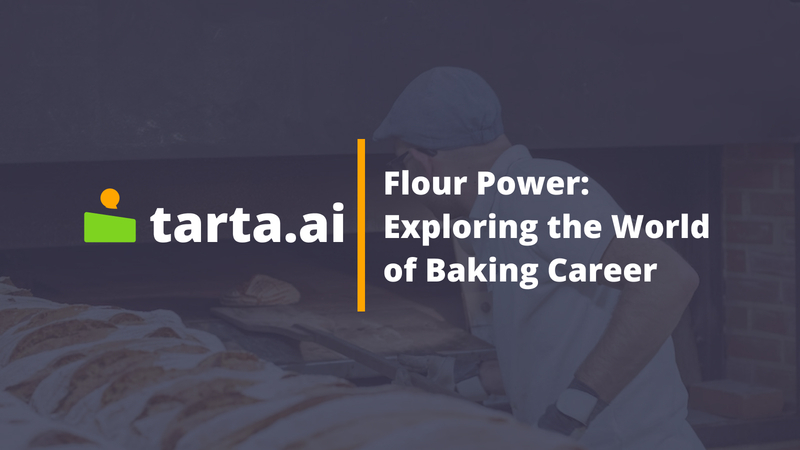
Baking is an age-old tradition that has been practiced for centuries. It is a combination of art and science, requiring a range of skills and knowledge to create delicious baked goods that we all enjoy. From artisanal bread baking to pastry baking, there are several subfields within the field of bakery, and pursuing a career as a baker can be both challenging and rewarding. In this article, we will discuss how to become a professional baker in the US, the skills and tools required, potential job opportunities, the benefits and disadvantages of a career in baking, and the government programs available to support bakers and other food business owners. Whether you are a seasoned baker or just starting, this article will serve as a useful resource for anyone interested in pursuing a career in the baking industry.
1. Job Description
A baker is a person who specializes in baking and selling bread, pastries, cakes, and other baked goods. They typically work in bakeries, pastry shops, restaurants, or hotels, and are responsible for preparing and baking various types of doughs, such as bread, cake, pastry, and pie crusts. Bakers often work early morning hours to ensure that their baked goods are ready for sale or delivery by the start of the day. They may also be involved in developing new recipes, managing inventory, and supervising other bakery staff.
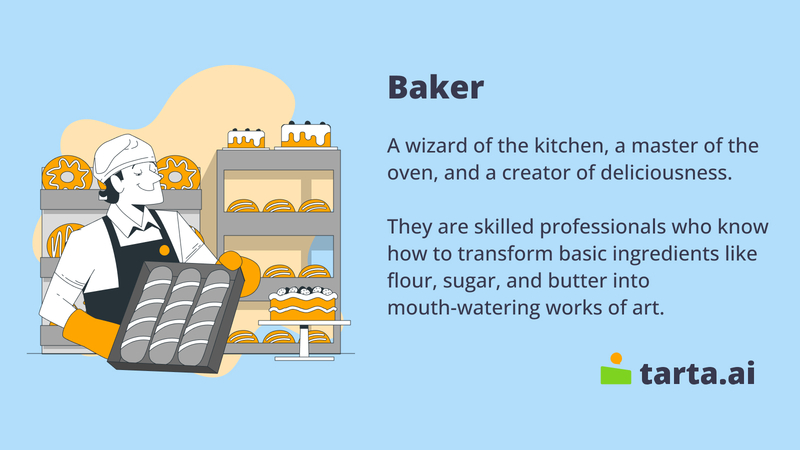
Requirements
The requirements to become a baker may vary depending on the location and employer, but some common requirements include:
- Education and training: Many bakers have a high school diploma or equivalent, but some may also have completed vocational or culinary school programs focused on baking and pastry arts.
- Knowledge and skills: Bakers should have a good understanding of baking techniques, ingredients, and recipe development. They should also possess physical dexterity and stamina, as baking can be a physically demanding job that requires standing for long periods and performing repetitive tasks.
- Experience: Some employers may require prior experience working in a bakery or food service environment.
- Licensing and certifications: In some states or countries, bakers may be required to hold a food handler's permit or other licensing or certification related to food safety and handling.
- Personal qualities: Successful bakers should have a strong work ethic, attention to detail, creativity, and the ability to work independently or as part of a team. They should also be able to work well under pressure and have good communication and customer service skills.
Interesting fact:
The job of a baker is one of the oldest professions in the world, dating back to ancient civilizations such as the Egyptians and Romans.
Duties and Responsibilities
The main responsibilities of a baker typically include:
- Preparing and baking doughs: This includes measuring and mixing ingredients, kneading dough, shaping dough into loaves, rolls, or other shapes, and baking in an oven or other baking equipment.
- Developing and testing new recipes: Bakers may experiment with new ingredients and techniques to create unique and appealing baked goods.
- Managing inventory and ordering supplies: Bakers may be responsible for monitoring inventory levels and ordering supplies, such as flour, sugar, and yeast, as needed.
- Ensuring quality and consistency: Bakers should be able to consistently produce high-quality baked goods that meet customer expectations.
- Maintaining cleanliness and safety: Bakers should follow strict food safety and sanitation guidelines to prevent cross-contamination and ensure a clean and safe work environment.
- Managing bakery staff: In some cases, bakers may be responsible for supervising other bakery staff, such as assistant bakers, pastry chefs, or kitchen assistants.
- Interacting with customers: Bakers may interact with customers to take orders, answer questions, and provide recommendations.
In addition to the main responsibilities mentioned earlier, bakers may also have additional duties depending on their specific job and workplace. Some additional duties of a baker may include:
- Decorating baked goods: Bakers may decorate cakes, cupcakes, and other pastries with frosting, fondant, or other decorative elements to create visually appealing products.
- Packaging and labeling products: Bakers may be responsible for packaging baked goods for sale, applying labels with ingredient information, pricing, and expiration dates.
- Maintaining equipment: Bakers may be responsible for cleaning and maintaining baking equipment, such as mixers, ovens, and proofers, to ensure they are in good working condition.
- Training new staff: Bakers with experience may train new staff members, including other bakers, pastry chefs, or kitchen assistants, to ensure they are knowledgeable and skilled in their work.
- Researching new trends and techniques: Bakers may stay up-to-date with new trends and techniques in baking, attend industry conferences or trade shows, and experiment with new ingredients and equipment to improve their products.
- Managing finances: Bakers may be responsible for managing finances, such as tracking expenses, calculating profits and losses, and preparing financial reports.
Bakers play a critical role in the production of baked goods, and their attention to detail and commitment to quality are essential for creating delicious and appealing products. These responsibilities and duties may vary depending on the specific bakery or pastry shop, and the size of the business. However, bakers should always be prepared to take on a variety of tasks to ensure the success of their products and their business.
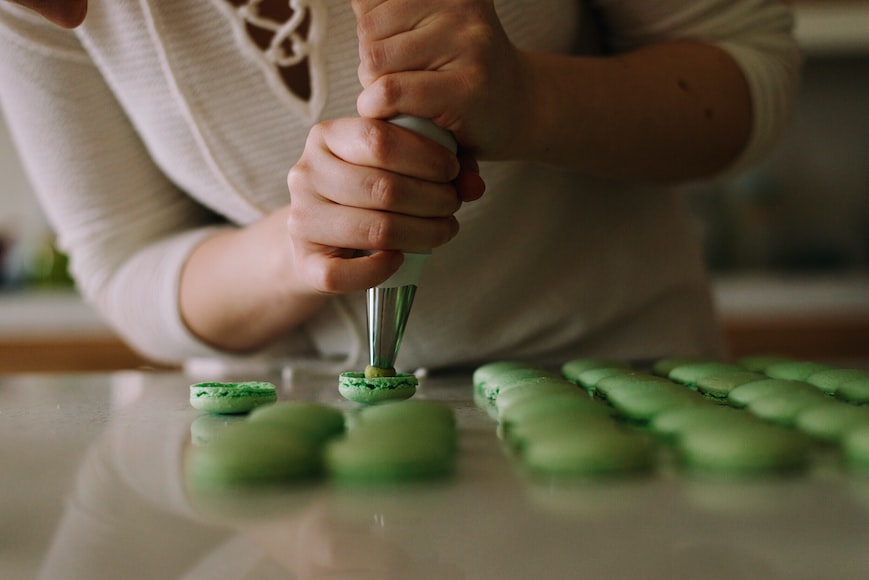
Photo: Holly Stratton/Unsplash
Hard and Soft Skills
Becoming a successful baker requires a combination of hard and soft skills. Here are some examples of each:
Hard skills | Soft skills |
Knowledge of baking techniques and methods | Attention to detail |
Ability to measure ingredients accurately | Strong work ethic and time management skills |
Familiarity with commercial baking equipment, such as mixers, ovens, and proofers | Good communication and customer service skills |
Understanding of food safety and sanitation guidelines | Flexibility and adaptability to changing circumstances |
Ability to follow recipes and adjust them as necessary | Creativity and ability to develop new recipes |
Knowledge of different types of flour and other baking ingredients | Ability to work independently or as part of a team |
Experience in working with various doughs and baking styles | Patience and persistence |
Understanding of portion control and food costing | Positive attitude and willingness to learn |
Both hard and soft skills are important for bakers to succeed in their profession. Hard skills are necessary to produce high-quality baked goods consistently, while soft skills help bakers work effectively with others and provide excellent customer service.
Interesting fact:
The majority of bakers (72%) worked in the retail bakery and pastry shop industry. The rest worked in grocery stores, restaurants, and other food services.
2. Salary
The salary of a baker in the US can vary depending on various factors such as their level of experience, location, and type of employer. According to data from PayScale, the median annual wage for bakers in the United States is $29,500 However, this can range from around $21,000 to over $38,000 per year.
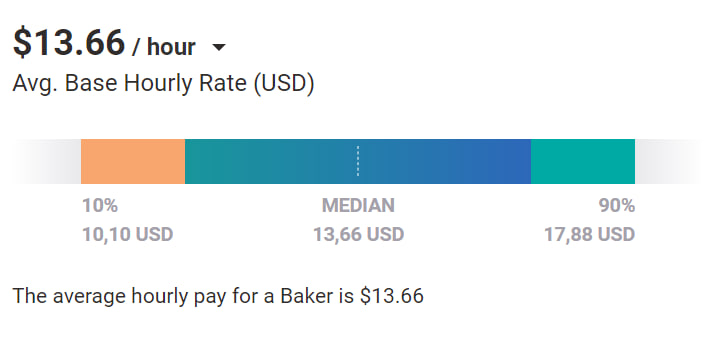
Source: PayScale
Bakers are responsible for preparing various baked goods such as bread, pastries, cakes, and cookies. They typically work in commercial bakeries, grocery stores, restaurants, and other food service establishments. The salary of a baker can vary depending on several factors such as:
- Experience: Bakers with more experience generally earn higher salaries. Those who have been in the field for many years may also have the opportunity to advance to managerial positions, which often come with higher pay.
- Location: The salary of a baker can vary depending on the cost of living in the area they work in. For example, bakers working in large cities such as New York or Los Angeles may earn higher salaries than those working in rural areas.
- Employer: The type of employer can also impact a baker's salary. For instance, bakers working in high-end restaurants, hotels, or gourmet bakeries may earn more than those working in grocery store bakeries.
- Skills and Specializations: Bakers with specialized skills, such as those who are trained in making artisanal bread or those who specialize in cake decorating, may be able to command higher salaries due to the demand for their expertise.
Ways to Improve Earnings
There are several ways that bakers can improve their earnings:
- Gain experience: The more experience a baker has, the more they can potentially earn. Gaining experience can also lead to opportunities for promotions and managerial positions that typically come with higher salaries.
- Develop specialized skills: Developing specialized skills such as cake decorating, bread making, or pastry artistry may be able to command higher salaries due to the demand for their expertise.
- Work in higher-end establishments: Working in high-end establishments such as upscale restaurants, hotels, or gourmet bakeries may earn more due to the quality of the products they produce and the level of service they provide.
- Consider freelancing: Some bakers choose to work as freelancers or independent contractors, which can allow them to set their own rates and potentially earn more than they would working for an employer.
- Seek additional training or education: Pursuing additional training or education, such as a degree in culinary arts, may be able to command higher salaries due to their level of expertise and knowledge.
- Look for opportunities to advance: Bakers who are interested in advancing their careers may seek out opportunities for promotions or management positions, which typically come with higher salaries.
Overall, there are several ways that bakers can improve their earnings by gaining experience, developing specialized skills, working in higher-end establishments, freelancing, pursuing additional training or education, and seeking opportunities for advancement.
Interesting fact:
Bagels were originally created in Poland and were introduced to the United States by Jewish immigrants in the late 19th century.
Additional Benefits
In addition to salary, bakers may also be eligible for various benefits, depending on their employer and the terms of their employment. Here are some examples of additional benefits that bakers may receive:
- Health insurance: Many employers offer health insurance benefits to their employees, including bakers. These benefits can include medical, dental, and vision insurance, as well as prescription drug coverage.
- Retirement savings plans: Some employers offer retirement savings plans such as 401(k) or pension plans to their employees. Bakers may be able to participate in these plans to save for their future.
- Paid time off: Many employers offer paid time off benefits, including vacation days, sick leave, and holidays. Bakers may be eligible for these benefits based on their employer's policies.
- Employee discounts: Bakers who work for grocery stores or bakeries may be eligible for employee discounts on baked goods or other products sold by their employer.
- Training and development opportunities: Employers may offer training and development opportunities for their employees, including bakers. These opportunities can help bakers to learn new skills and advance their careers.
- Flexible schedules: Depending on the employer, bakers may be able to work flexible schedules that accommodate their needs, such as working early mornings or late nights.
Overall, while salary is an important factor, bakers may also be able to enjoy additional benefits that can make their employment more rewarding and attractive. These benefits can include health insurance, retirement savings plans, paid time off, employee discounts, training and development opportunities, and flexible schedules.
3. Job Environment
To produce their baked goods, bakers use a range of tools and technologies, from mixers and ovens to pastry bags and computerized recipe management systems. Here, we will explore the environment, tools and technologies used by bakers in more detail, and examine how they are used to create the delicious treats we all know and love.
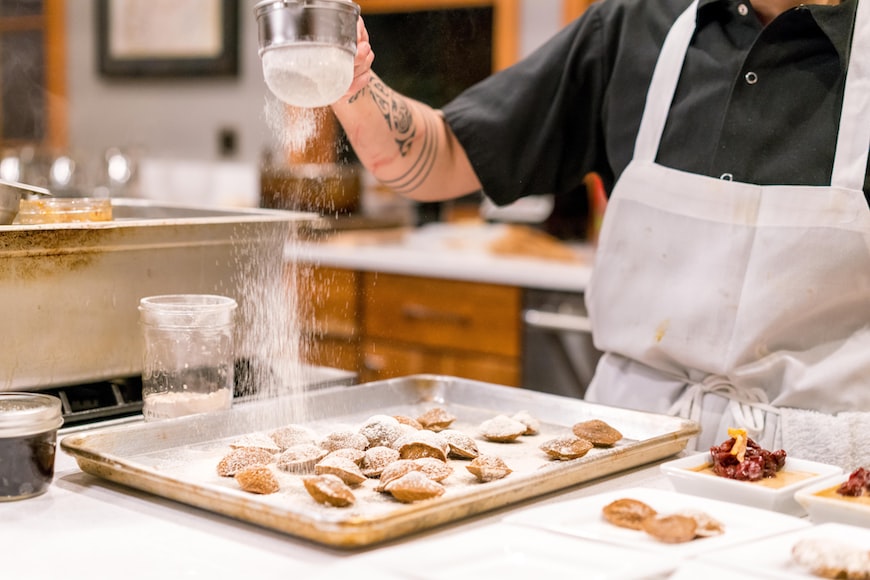
Photo: Elevate/Unsplash
As a baker, it's important to work in an environment that is clean, well-lit, and properly equipped with the necessary tools and equipment. Here are some job environment settings that can benefit bakers:
- Cleanliness: Bakers should work in a clean environment to ensure the quality and safety of their products. The work area should be cleaned thoroughly before and after each use, and all equipment should be regularly sanitized.
- Temperature and humidity control: Temperature and humidity can affect the quality of baked goods, so it's important to work in an environment where these factors are controlled. Ideally, the temperature should be between 68-74°F (20-23°C) and humidity between 45-50%.
- Lighting: Bakers need to be able to see their work clearly, so the work area should be well-lit with natural light or bright artificial lighting.
- Space: Bakers need enough space to move around and work comfortably, especially when handling large batches of dough or using large equipment.
- Ventilation: Adequate ventilation is essential to prevent the buildup of fumes and unpleasant odors that can affect the quality of baked goods and the health of workers.
- Safety: Bakers should work in an environment that is safe and free from hazards. This includes proper training on equipment operation, handling of hot materials, and use of protective gear such as gloves, aprons, and hairnets.
By working in an environment that meets these criteria, bakers can produce high-quality products and work safely and efficiently.
Interesting fact:
There were approximately 177,800 bakers employed in the United States.
Bakers use a variety of tools and technologies to create their baked goods. Here are some of the most common tools and technologies used in baking:
- Mixers: Bakers use mixers to combine ingredients thoroughly and quickly. Mixers can be manual, electric, or stand mixers.
- Ovens: Ovens are essential for baking. Bakers use different types of ovens, such as convection ovens, deck ovens, and rotating rack ovens, depending on their needs.
- Scales: Precise measurements are important in baking, and bakers use scales to weigh ingredients accurately.
- Proofing boxes: Proofing boxes are used to provide a warm, humid environment for yeast doughs to rise properly.
- Pastry bags: Pastry bags are used to pipe doughs, frostings, and fillings in precise patterns.
- Rolling pins: Rolling pins are used to flatten doughs to the desired thickness.
- Pastry cutters: Pastry cutters are used to cut doughs into specific shapes and sizes.
- Cookie cutters: Cookie cutters are used to cut cookie doughs into fun shapes and designs.
- Bread slicers: Bread slicers are used to cut bread into uniform slices.
- Digital thermometers: Digital thermometers are used to measure the temperature of ingredients, doughs, and baked goods accurately.
- Automated dough sheeters: Automated dough sheeters are used to roll and stretch dough to the desired thickness and consistency.
- Computerized recipe management systems: Computerized recipe management systems can be used to store and manage recipes, ingredient inventories, and production schedules.
By using these tools and technologies, bakers can produce consistent and high-quality baked goods efficiently.
4. Education
This section provides an overview of the steps involved in becoming a baker in the US, including the education and training required to enter this profession. Additionally, the importance of certification is discussed, as it can demonstrate an individual's skills and knowledge in the field and provide them with a competitive edge.
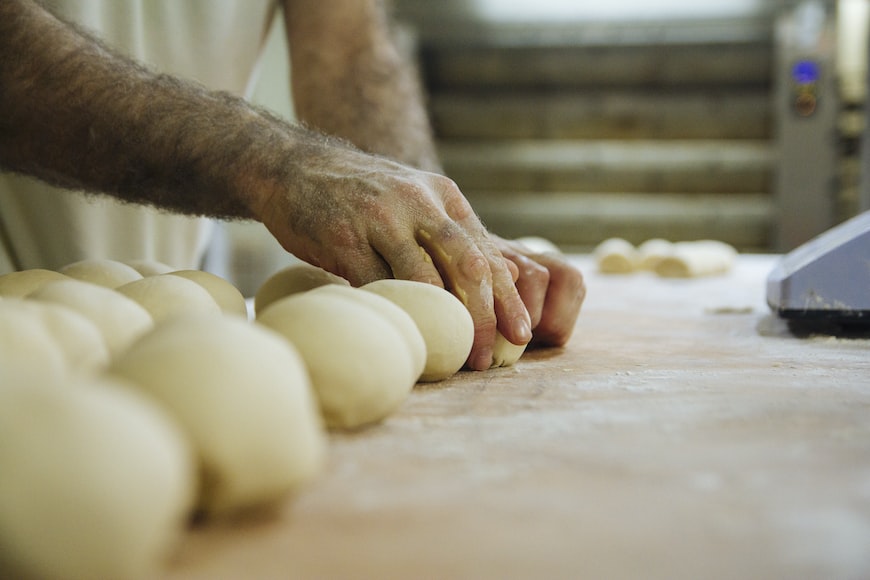
Photo: Victor Rodríguez Iglesias/Unsplash
To become a professional baker in the US, you typically need a combination of formal education and hands-on experience. Here are the steps you can take to become a baker in the US:
- High School Education: A high school diploma or GED is usually required to become a baker. During high school, you may take courses in math, science, English, and business to prepare for a career in baking.
- Culinary School: While a culinary school is not always required, it can be helpful to obtain formal training in baking and pastry arts. You may earn an associate's degree or a certificate in baking and pastry arts from a culinary school, community college or trade school. These programs typically include courses in food safety and sanitation, nutrition, baking techniques, pastry arts, and business management.
- On-the-Job Training: Bakers may receive on-the-job training by working in a bakery or restaurant. This allows them to learn from experienced bakers and gain hands-on experience in baking and pastry arts.
- Certification: Certification is not required to become a baker, but it can demonstrate your skills and knowledge to potential employers. The American Culinary Federation offers certification in baking and pastry arts for experienced bakers.
- Continuing Education: To stay up-to-date with the latest trends and techniques in baking, bakers may need to participate in continuing education programs, attend conferences, or read industry publications.
Interesting fact:
The states with the highest employment levels for bakers were California, Texas, Florida, New York, and Pennsylvania.
Certification is a process by which an individual's skills and knowledge in a specific field are evaluated and validated by a third-party organization. In the context of becoming a baker in the US, certification can demonstrate to employers and customers that you have the skills and knowledge necessary to produce high-quality baked goods.
There are several organizations that offer certification for bakers in the US. One of the most well-known is the American Culinary Federation (ACF), which offers certification in baking and pastry arts. To become certified by the ACF, you must meet certain eligibility requirements, which may include education and experience in the field, and pass a written and practical exam.
Other organizations that offer certification for bakers include the Retail Bakers of America (RBA) and the Bread Bakers Guild of America (BBGA). These organizations may have their own eligibility requirements and exam formats.
Obtaining certification can be beneficial for bakers in several ways. It can increase their job opportunities, provide a competitive advantage over non-certified bakers, and enhance their professional reputation. It can also serve as a way to continue learning and improving their skills in the field. Overall, a combination of formal education, hands-on training, and certification can help you become a successful baker in the US.
5. Career Paths
In recent years, there has been a renewed interest in baking, with many people taking up baking as a hobby or pursuing it as a career. This section covers various aspects of baking, including developing a career, alternative career options, and subfields within the field of bakery.
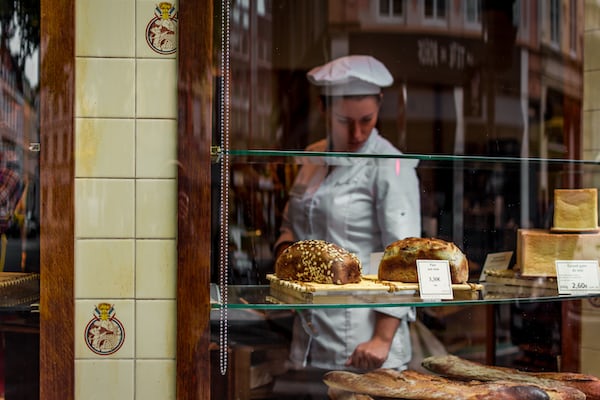
Photo: Anh Tran/Unsplash
There are several ways to develop a career as a baker:
- Gain baking skills: You need to learn the fundamental skills required for baking, such as measuring ingredients, mixing dough, proofing, and baking. You can learn these skills by attending culinary school, taking baking classes or workshops, or gaining hands-on experience by working in a bakery.
- Specialize in a particular type of baking: You can specialize in a particular type of baking, such as artisanal bread, pastries, cakes, or gluten-free baking. Specializing in a particular type of baking can help you develop a unique skillset and build a reputation as an expert in that area.
- Practice baking: The more you bake, the better you will become. Practice different recipes and techniques to hone your skills.
- Network: Attend baking conferences, join baking clubs, and connect with other bakers in your area. Networking can help you gain insight into the industry and potentially lead to job opportunities.
- Gain work experience: Look for apprenticeships, internships, or entry-level positions at bakeries to gain work experience. This will help you learn from experienced bakers, develop your skills, and build a portfolio of work.
- Build a portfolio: Create a portfolio of your work, including photographs of your baked goods and any certifications or awards you have received. A portfolio can help you showcase your skills and demonstrate your experience to potential employers.
- Consider entrepreneurship: If you have a passion for baking and are willing to take on the challenges of running a business, consider starting your own bakery. This will require a lot of hard work, but it can be a rewarding way to build a career as a baker.
There are several subfields within the field of bakery, including:
Subfield | Description |
Artisanal bread baking | Artisanal bread baking involves creating bread using traditional methods, such as sourdough fermentation, and using high-quality ingredients. This subfield requires knowledge of different types of flour, yeast, and dough handling techniques. |
Pastry baking | Pastry baking involves creating sweet baked goods, such as cakes, cookies, and pastries. This subfield requires knowledge of ingredients like sugar, butter, and chocolate, as well as decorating techniques. |
Cake decorating | Cake decorating involves creating and decorating cakes for special occasions, such as weddings and birthdays. This subfield requires knowledge of frosting, fondant, and cake sculpting techniques. |
Gluten-free baking | Gluten-free baking involves creating baked goods without using gluten-containing ingredients, which can be challenging because gluten is essential for the structure and texture of baked goods. This subfield requires knowledge of alternative flours and binding agents. |
Bread and pastry production | Bread and pastry production involves producing baked goods on a large scale, such as for a commercial bakery or a restaurant. This subfield requires knowledge of production schedules, quality control, and equipment handling. |
Research and development | Research and development in a bakery involves experimenting with different ingredients and techniques to develop new products or improve existing ones. This subfield requires knowledge of food science and testing methods. |
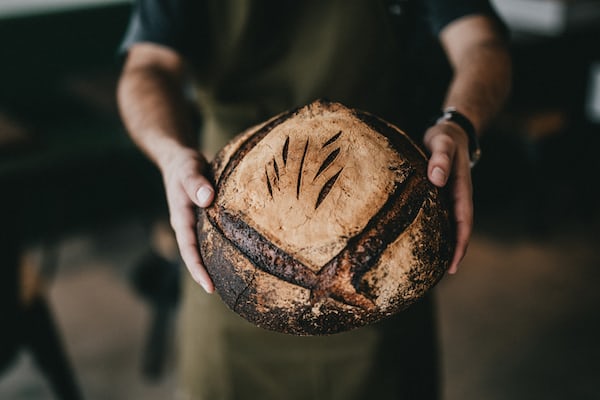
Photo: Nathan Dumlao/Unsplash
If you're a baker and want to explore alternative career options, here are some ideas:
- Food blogger or food writer: If you have a passion for food and enjoy writing, you could start a food blog or write about food for publications. This career could allow you to share your knowledge of baking and food with a wider audience.
- Food stylist: Food stylists work with photographers, chefs, and advertisers to create visually appealing images of food for print and digital media. If you have an eye for design and enjoy creating beautiful presentations of baked goods, this could be a good career option for you.
- Culinary instructor: If you enjoy teaching and want to share your baking skills with others, you could become a culinary instructor. This career could allow you to teach baking skills to students of all ages and skill levels.
- Food scientist: Food scientists work in research and development to improve the quality, safety, and nutritional value of food products. If you have a background in baking and an interest in science, this could be a good career option for you.
- Chef or restaurant owner: If you enjoy baking but also want to explore other aspects of the culinary world, you could become a chef or open your own restaurant. This career would allow you to explore different cuisines and cooking techniques, while still utilizing your baking skills.
- Product development specialist: Product development specialists work with food manufacturers to develop new food products or improve existing ones. If you have a background in baking and an interest in product development, this could be a good career option for you.
- Food photographer or food videographer: Food photographers and videographers work with chefs and food stylists to create visually stunning images and videos of food for advertising and social media. If you have an interest in photography or videography, this could be a good career option for you.
Baking is a popular and rewarding culinary skill that has been enjoyed for centuries. Whether you are a professional baker or a home baker, the process of baking requires creativity, precision, and knowledge of various ingredients and techniques. With a wide range of subfields within the field of bakery, there are many career options available for those who want to pursue baking as a profession. Moreover, baking is a hobby that can be enjoyed by anyone, regardless of their skill level or experience. It is a delicious and satisfying way to express creativity and share with others. Whether you are a beginner or an experienced baker, there is always something new to learn and discover in the world of baking.
6. Job Market
Demand for Bakers
According to the U.S. Bureau of Labor Statistics (BLS), the demand for bakers in the United States is expected to remain positive over the next decade. Between 2021 and 2031, the BLS projects that employment of bakers will grow by about 8 percent, which is faster than the average growth rate for all occupations.
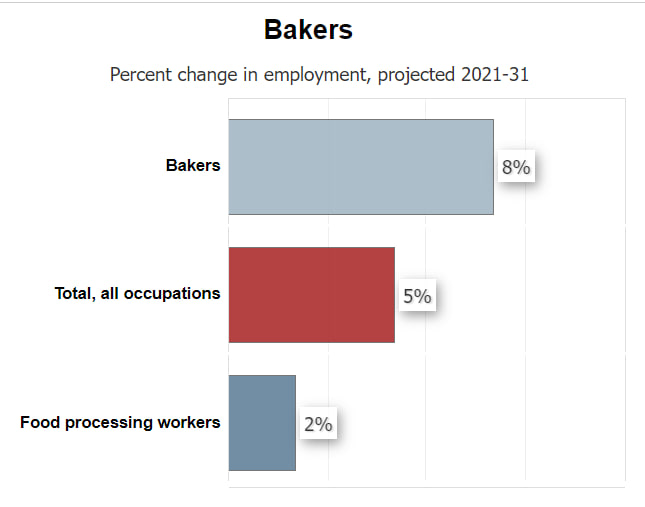
Source: U.S. Bureau of Labor Statistics, Employment Projections program
However, the demand for bakers can vary depending on the region of the country and the specific industry. For example, bakers who work in grocery stores, specialty food stores, and other retail establishments may face more competition for jobs, while those who work in restaurants, hotels, and other food service establishments may have more opportunities for employment.
In addition to traditional baking skills, bakers who have experience with specialty diets such as gluten-free, vegan, or low-carb may also be in higher demand. Finally, those who are willing to work non-traditional hours, such as early mornings, late nights, and weekends, may have an easier time finding employment in the industry.
Part-time and Remote Jobs
Part-time and remote job options for bakers can be limited, as baking typically requires hands-on work in a physical location. However, there are a few potential options:
- Freelance Baking: Bakers can offer their services on a freelance basis, taking on small-scale baking projects for individuals or businesses. This can be done on a part-time basis and can potentially be done from home if the baker has a dedicated kitchen space.
- Recipe Development: Bakers with a lot of experience can work as recipe developers, creating and testing new recipes for cookbooks, food blogs, and other publications. This work can potentially be done remotely, with the baker submitting recipes and testing notes electronically.
- Online Baking Classes: Bakers can teach baking classes online through video conferencing platforms. This can be done on a part-time basis and can be done from the baker's own kitchen.
- Bakery Administration: While not directly involved in baking, there are administrative roles within bakeries that can be done remotely, such as managing inventory, scheduling, and customer service.
Many part-time or remote job options for bakers may require some additional skills, such as social media marketing, recipe development, or online teaching. Bakers may need to broaden their skill set to be competitive in these fields.
7. Job Satisfaction
Here, we will explore the pros and cons of a baker job. Baking is an art that requires creativity and skill, and as a baker, you have the opportunity to create unique and delicious baked goods that bring joy to others. However, like any job, there are also some challenges and drawbacks to working as a baker. We will discuss both the positive and negative aspects of this profession to give you a better understanding of what it's like to work as a baker.
Pros | Cons |
Creativity Baking is an art, and as a baker, you have the opportunity to experiment with different ingredients and create unique and delicious baked goods. | Physical Demands Baking requires a lot of physical labor, including lifting heavy bags of flour and standing for long periods of time. This can cause strain on your back, legs, and feet. |
Job Satisfaction As a baker, you get to see the fruits of your labor every day. You can take pride in creating something from scratch and making people happy with your baked goods. | Early Mornings Most bakers start their day very early in the morning, often before dawn, to prepare for the day ahead. This can be challenging for those who are not early risers. |
Flexibility Bakers often work early mornings or late nights, which can be ideal for those who prefer a non-traditional work schedule. This also means you may have more time for personal or family activities during the day. | Irregular Schedule Bakers often work on weekends and holidays when demand for baked goods is highest. This can mean missing out on social or family events. |
Career Growth With experience and skill, bakers can become pastry chefs or open their own bakeries, which can offer greater financial rewards and independence. | Fast-paced Environment Baking can be a stressful job, especially during busy periods such as holidays or special events. You need to be able to work efficiently and manage your time well to meet customer demands. |
Interesting fact:
Bakers celebrate National Bakery Day on September 28th each year to recognize the important role that baking plays in our lives.
Working as a baker has its advantages and disadvantages. On the one hand, bakers can take pride in their creativity, enjoy job satisfaction, and have opportunities for career growth. On the other hand, this profession can be physically demanding, require early mornings and irregular schedules, and be stressful during busy periods. Ultimately, the decision to pursue a career as a baker depends on your personal interests and priorities. By considering both the pros and cons, you can make an informed decision about whether this profession is the right fit for you.
8. Government Programs
Starting and growing a bakery business can be a challenging endeavor, requiring significant investment in equipment, ingredients, and personnel. Fortunately, there are several government programs available in the US that can provide support and resources to bakers and other food business owners. These programs can help with funding, training, regulatory compliance, and other crucial aspects of running a successful bakery. In this response, we will explore some of the key government programs that bakers in the US can take advantage of to start and grow their businesses.
There are several government programs in the US that can benefit bakers, including:
- Small Business Administration (SBA) loans: The SBA provides loans to small businesses, including bakeries, to help with startup costs, expansion, or other business needs. The SBA also offers counseling and training programs to help business owners succeed.
- Department of Agriculture (USDA) grants: The USDA offers grants to small businesses in rural areas, which could include bakeries, to help with business development and growth.
- Department of Labor (DOL) training programs: The DOL offers training programs to help workers in various industries, including baking, improve their skills and stay up-to-date with industry trends.
- Department of Health and Human Services (HHS) food safety programs: The HHS offers resources and training programs to help food businesses, including bakeries, comply with food safety regulations and best practices.
- State and local economic development programs: Many state and local governments offer programs to support small businesses, including bakeries. These programs can include tax incentives, grants, and other forms of financial assistance.
It's important to note that eligibility for these programs can vary depending on factors such as the size of the bakery and the location. Business owners should research the specific requirements and application processes for each program before applying.
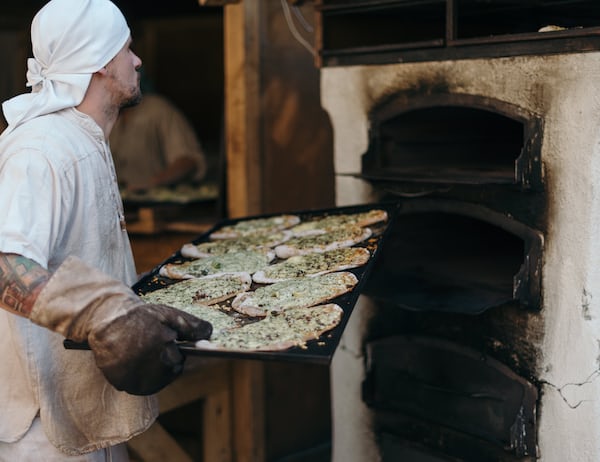
Photo: Roman Craft/Unsplash
Becoming a professional baker requires a combination of skills, knowledge, and passion. From measuring ingredients accurately to using commercial baking equipment and developing new recipes, bakers must possess a diverse set of skills to create high-quality baked goods. This article has provided a comprehensive guide on how to become a professional baker in the US, including the educational requirements, potential job opportunities, the benefits and disadvantages of a career in baking, and government programs available to support bakers and other food business owners. Whether you are a beginner or an experienced baker, we hope that this article has been helpful in providing you with the information you need to pursue a successful career in the baking industry.
- Baking is a combination of art and science that requires a range of skills and knowledge.
- To become a professional baker in the US, one must obtain a high school diploma, attend culinary school, and gain on-the-job training and certification.
- There are various career options within the field of baking, such as artisanal bread baking, pastry baking, cake decorating, and entrepreneurship.
- The demand for bakers in the US is expected to grow over the next decade, with potential job opportunities in food service establishments.
- The benefits of becoming a baker include opportunities for creativity, job satisfaction, and career growth.
- The disadvantages of becoming a baker include physical demands, early mornings, irregular schedules, and a fast-paced work environment.
- Government programs are available in the US to support bakers and other food business owners, providing valuable resources and support for starting and growing a successful bakery business.
FAQ
What does a baker do?
A baker is responsible for preparing and baking a wide variety of baked goods. They may also develop new recipes, manage inventory and ordering supplies, maintain cleanliness and safety, manage bakery staff, interact with customers, decorate baked goods, and package and label products.
What skills does a baker need?
A baker requires a combination of hard and soft skills, including knowledge of baking techniques, ability to measure ingredients accurately, familiarity with commercial baking equipment, creativity, and good communication and customer service skills.
How much do bakers earn?
Bakers in the US earn a median salary of around $29,500 per year, but their earning potential can vary depending on factors such as their level of experience, location, type of employer, and specialized skills.
What tools and technologies do bakers use?
Bakers use a variety of tools such as mixers, ovens, scales, pastry bags, rolling pins, and bread slicers, to name a few. Additionally, technologies such as computerized recipe management systems are used to store and manage recipes, ingredients, and production schedules.
What are the educational requirements for becoming a baker?
The educational requirements for becoming a baker can vary, but typically include obtaining a high school diploma and attending culinary school. On-the-job training and certification can also be important for advancing in the field.
What are the career options for bakers?
Bakers can pursue a variety of career options such as food blogging, food styling, culinary instruction, food science, chef or restaurant owner, product development specialist, and food photography or videography.